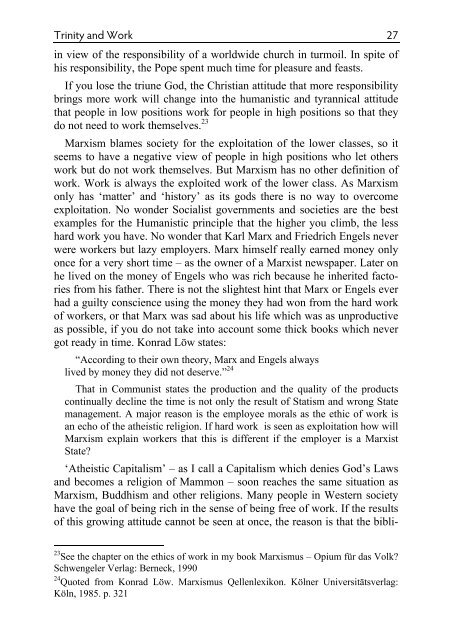Love is the Fulfillment of Law - World Evangelical Alliance
Love is the Fulfillment of Law - World Evangelical Alliance
Love is the Fulfillment of Law - World Evangelical Alliance
You also want an ePaper? Increase the reach of your titles
YUMPU automatically turns print PDFs into web optimized ePapers that Google loves.
Trinity and Work 27<br />
in view <strong>of</strong> <strong>the</strong> responsibility <strong>of</strong> a worldwide church in turmoil. In spite <strong>of</strong><br />
h<strong>is</strong> responsibility, <strong>the</strong> Pope spent much time for pleasure and feasts.<br />
If you lose <strong>the</strong> triune God, <strong>the</strong> Chr<strong>is</strong>tian attitude that more responsibility<br />
brings more work will change into <strong>the</strong> human<strong>is</strong>tic and tyrannical attitude<br />
that people in low positions work for people in high positions so that <strong>the</strong>y<br />
do not need to work <strong>the</strong>mselves. 23<br />
Marx<strong>is</strong>m blames society for <strong>the</strong> exploitation <strong>of</strong> <strong>the</strong> lower classes, so it<br />
seems to have a negative view <strong>of</strong> people in high positions who let o<strong>the</strong>rs<br />
work but do not work <strong>the</strong>mselves. But Marx<strong>is</strong>m has no o<strong>the</strong>r definition <strong>of</strong><br />
work. Work <strong>is</strong> always <strong>the</strong> exploited work <strong>of</strong> <strong>the</strong> lower class. As Marx<strong>is</strong>m<br />
only has ‘matter’ and ‘h<strong>is</strong>tory’ as its gods <strong>the</strong>re <strong>is</strong> no way to overcome<br />
exploitation. No wonder Social<strong>is</strong>t governments and societies are <strong>the</strong> best<br />
examples for <strong>the</strong> Human<strong>is</strong>tic principle that <strong>the</strong> higher you climb, <strong>the</strong> less<br />
hard work you have. No wonder that Karl Marx and Friedrich Engels never<br />
were workers but lazy employers. Marx himself really earned money only<br />
once for a very short time – as <strong>the</strong> owner <strong>of</strong> a Marx<strong>is</strong>t newspaper. Later on<br />
he lived on <strong>the</strong> money <strong>of</strong> Engels who was rich because he inherited factories<br />
from h<strong>is</strong> fa<strong>the</strong>r. There <strong>is</strong> not <strong>the</strong> slightest hint that Marx or Engels ever<br />
had a guilty conscience using <strong>the</strong> money <strong>the</strong>y had won from <strong>the</strong> hard work<br />
<strong>of</strong> workers, or that Marx was sad about h<strong>is</strong> life which was as unproductive<br />
as possible, if you do not take into account some thick books which never<br />
got ready in time. Konrad Löw states:<br />
“According to <strong>the</strong>ir own <strong>the</strong>ory, Marx and Engels always<br />
lived by money <strong>the</strong>y did not deserve.” 24<br />
That in Commun<strong>is</strong>t states <strong>the</strong> production and <strong>the</strong> quality <strong>of</strong> <strong>the</strong> products<br />
continually decline <strong>the</strong> time <strong>is</strong> not only <strong>the</strong> result <strong>of</strong> Stat<strong>is</strong>m and wrong State<br />
management. A major reason <strong>is</strong> <strong>the</strong> employee morals as <strong>the</strong> ethic <strong>of</strong> work <strong>is</strong><br />
an echo <strong>of</strong> <strong>the</strong> a<strong>the</strong><strong>is</strong>tic religion. If hard work <strong>is</strong> seen as exploitation how will<br />
Marx<strong>is</strong>m explain workers that th<strong>is</strong> <strong>is</strong> different if <strong>the</strong> employer <strong>is</strong> a Marx<strong>is</strong>t<br />
State?<br />
‘A<strong>the</strong><strong>is</strong>tic Capital<strong>is</strong>m’ – as I call a Capital<strong>is</strong>m which denies God’s <strong>Law</strong>s<br />
and becomes a religion <strong>of</strong> Mammon – soon reaches <strong>the</strong> same situation as<br />
Marx<strong>is</strong>m, Buddh<strong>is</strong>m and o<strong>the</strong>r religions. Many people in Western society<br />
have <strong>the</strong> goal <strong>of</strong> being rich in <strong>the</strong> sense <strong>of</strong> being free <strong>of</strong> work. If <strong>the</strong> results<br />
<strong>of</strong> th<strong>is</strong> growing attitude cannot be seen at once, <strong>the</strong> reason <strong>is</strong> that <strong>the</strong> bibli-<br />
23<br />
See <strong>the</strong> chapter on <strong>the</strong> ethics <strong>of</strong> work in my book Marx<strong>is</strong>mus – Opium für das Volk?<br />
Schwengeler Verlag: Berneck, 1990<br />
24<br />
Quoted from Konrad Löw. Marx<strong>is</strong>mus Qellenlexikon. Kölner Universitätsverlag:<br />
Köln, 1985. p. 321

















